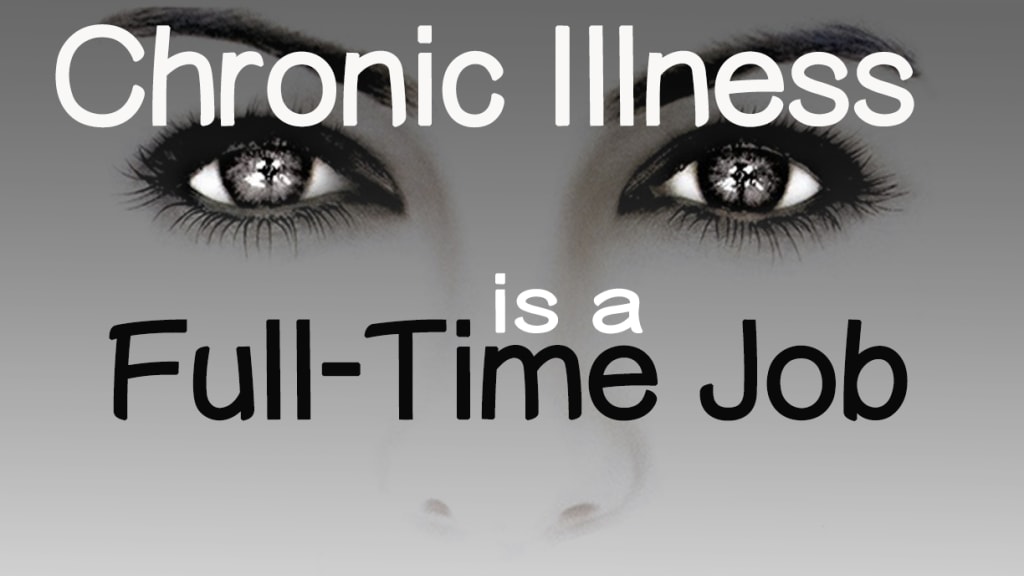
Managing chronic illness is a full-time job. For those of you who deal with it on a daily basis, you understand. For those that don't, you would never imagine how much time, effort, and strength it takes out of every single day. On top of working a full-time job, managing my health condition leads me into amazement of how well I keep it together during the eight hour days. It's when I get home when I fall apart from exhaustion.
Depression. That is a whole other condition to manage on top of a full-time job and the chronic illness. I stated how amazed I am that I keep it together, but this doesn't omit me from depression, nor anxiety, which often goes hand-in-hand. What is depression? A friend recently posted this statement: "Depression is not a sign of weakness, it is a sign of having tried too hard for too long." I can't agree with this more. When you try so hard for so long, hopeful slowly turns in to hopeless. You get your hopes up and then they are brought down over and over again when pills and treatments don't work. This cycle is even harder to break in the midst of disease. One day, you feel a tiny bit better, like you can breathe again, and then just as easily as it left you, the depression (and anxiety), in an instant, can return with a vengeance.
You make your trips to the doctor with confidence that they will find something to treat. You take medication after medication without improvements. Too much of this for too long will lead to depression. This is added on top of your other full-time jobs: going to work, taking care of the house and family, paying bills, etc. It can definitely wear you down. And for those who have others who are also sick to take care of—kids, a spouse, elderly parents, etc.—it can feel like you are carrying a thousand pounds trying to make it through each day. Mental illness is real, and when it is compounded with illness, it becomes more difficult to fight.
There is an article called the Spoon Theory written by Christine Miserandino. Her theory explains how everyone begins their day with a limited number of spoons—let's say ten spoons each. You get ten spoons and I get ten spoons. Each spoon represents a task completed that day. For instance, a healthy person gets up and takes a shower, then proceeds to get ready for the day. This requires not even one spoon for them because it didn't take much effort, didn't require much energy. For someone who is chronically ill, that same task may take one, two, or even three spoons depending on how much fatigue you experience as the result of your condition. The catch is that those of us who are chronically ill start the day out with the same number of spoons, yet with less stamina, which will leave us with fewer spoons earlier in the day than someone who is healthy. By the end of the day, we may not have any spoons left, while those who have their health may still have a few spoons remaining and energy to finish those spoons out. All of us, healthy or not, have added responsibilities throughout the day, but those of us trying to manage our symptoms have even more responsibility—the full-time job of managing our health as we juggle handfuls of pills taken daily and ongoing doctor's visits and treatments. We have to manage pain, depression, stress, and sometimes hopelessness. Bottom line, we don't get as much done as others. This can be frustrating and discouraging to those of us who have the will, but not the wattage.
So, if you are like me and find yourself frustrated because you don't have the stamina to do what you desire nor what you used to be able to do, here are some tips I am currently working on, as I have recently been forced to make some changes in my lifestyle after being laid off from my full-time job:
- Give yourself grace: If I could do what others do, I would. Wouldn't you? We have to identify our limitations and come to terms with them. I tell you, it's not easy, so don't expect it to be. It takes practice, patience with ourselves and a lot of self-talk.
- Restructure your life: I have always since I was 25-years-old (I am now 45) worked full-time. My first job required me to work up to 80 hours a week as a middle school teacher—no, teachers don't get afternoons, evenings, and weekends off as many assume they do. They say sometimes when you refuse to make changes you are eventually forced to do so. I am now looking at my limitations and facing them. I am coming to terms with working part-time and naturally being a worker who has always had the drive to work full-time outside of the home; I am struggling. I am trying to determine how I can work out of the house part-time and at home part-time to supplement the income that will be lost. It's difficult, but keeping my ears and eyes open.
- Talk to others, reach out for support: I have always been a worrier, from early childhood—probably not the best thing for my health. I have one friend that allows me to call her most anytime and ask her to tell me, "Everything is going to be okay!" I need to hear encouraging words from others because I am not always good at speaking encouraging words to myself. I am trying to do better.
- Find things that you can do to keep your mind busy: Try not to lie in bed all day, even if it is getting out of bed to try and do one thing like cleaning out a drawer. If you did that one time a day, you would eventually make progress.
- Find a counselor or a someone not emotionally involved to talk to: Talk to whom you can vent freely to with no judgment, no repercussions, etc. They now have counselors who will Skype with you from your own bed, while you are in your pajamas!
- Find something on television that calms you: I have Netflix (we had to get rid of cable due to cost) and there are a couple of shows that calm me down. I tend to watch the episodes over and over. Because I have esophageal and stomach issues and have trouble eating, I always turn on Grace and Frankie to calm my system down. I haven't figured out what it is about that show that levels my emotions. But it works!
- Pray: I pray a lot when things seem out of control. I pray for guidance, peace, healing, stamina, endurance, patience, and hope. I have learned that life is not always easy and doesn't get easier, so I turn to the the one I believe to be in control and trust that he is carrying me.
- I am sure I will wake up tomorrow and I will have thought of something I should have added to the list. But, ultimately, here is what I want you to know: You and I can only do your best with what we are facing. And we have to get to a point and believe our best is good enough. Because it is!
You can find the Spoon Theoryhere.
About the Creator
No one
I live with Lyme disease and founded the North Texas Lyme Support Group in the Dallas Fort-Worth Area in 2010. I write about invisible chronic illness related to Lyme disease for educational purposes.






Comments
There are no comments for this story
Be the first to respond and start the conversation.